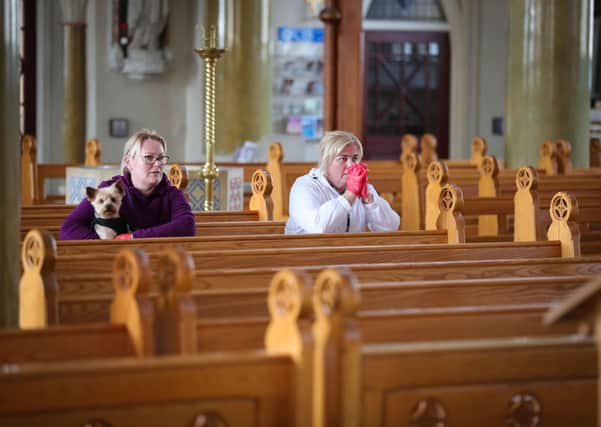Coronavirus: Executive bans solitary prayer that Arlene Foster last week said was fine


Last Tuesday afternoon – almost a day after the prime minister had announced the current measures which keep most of the population at home – Mrs Foster said that churches would remain open for solitary prayer, rather than for services.
The first minister, who noted that the issue was more significant to Catholic churches, raised the point of her own volition, rather than in response to a question about church buildings.
Advertisement
Hide AdAdvertisement
Hide AdReferring to the Executive’s list of what should and should not close, Mrs Foster said: “It also deals with issues such as church buildings and I think it is important that I say this because there is a tradition, particularly in the Catholic faith, where people go individually to their churches to pray. That is still acceptable.
“What we’re talking about is services such as baptisms and ordinary Sunday services.
“We do not want to prevent – as happened on Sunday – ministers took the opportunity to do Facebook Live or webcam services, which was a great way of reaching out to people in their own homes; we certainly don’t want to prevent that from happening so we have put clarity around that for our clergy so they can be clear about what happens.”
However, on Saturday evening the Executive met to agree the regulations which set out in law the circumstances in which the public can leave their homes without penalty.
Advertisement
Hide AdAdvertisement
Hide AdNot only does the legislation not contain an exemption for what Mrs Foster referred to, but it specifically prohibits it.
The regulations state: “A person who is responsible for a place of worship must ensure that, during the emergency period, the place of worship is closed.”
The only exemptions to that prohibition are for funerals, to broadcast an act of worship online, for radio or for TV, or to provide “essential voluntary services or urgent public support services” such as food banks.
The News Letter asked The Executive Office about the potential for the public to break the law based on taking Mrs Foster’s advice and asked why the regulations contradicted what she had said.
Advertisement
Hide AdAdvertisement
Hide AdA spokeswoman said: “Churches can now only open for those reasons set out in the regulations published on March 28.
“We are in a rapidly evolving situation and decisions will reflect the emerging situation and expert advice.
“This is in line with our overall strategy to take the right action, at the right time, to achieve the best possible outcomes.”